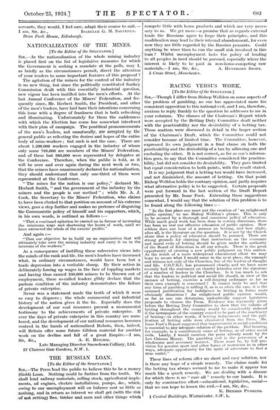• RACING VERSUS WORK. [To the Editor of the SPECTATOR.]
Sin,—Though I differ from Bishop Welldon on some aspects of the problem of gambling, no one has appreciated more his consistent opposition to this national evil, and I am, therefore, anxious to reply frankly to the question he addresses to me in your columns. The clauses of the Chairman's Report which were accepted by the Betting Duty Committee dealt neither with the practicability nor the desirability of a betting tax. Those matters were discussed in detail in the larger section
of the Chairman's Draft, which the Committee could not consider because of limited time. The Committee, however, expressed its own judgment in a final clause on both the practicability and the-desirability of a tax by affirming one and excluding the other. It is not correct, as far as one's informa- tion goes, to say that the Committee considered the practica- bility, but did not consider its desirability. They gave limited but equal consideration to both points, with the result stated.
It is my judgment that a betting tax would have increased, and not diminished, the amount of betting. On that point Bishop Welldon holds the contrary opinion, and justly inquires what alternative policy is to be suggested. Certain proposals were put forward in the last section of the Draft Report presented by Mr. Isaac Foot. Extending those suggestions somewhat, I would say that the solution of this problem is to be found along the following lines :— "In the first place one must put the creation of 'an enlightened public opinion,'- to use Bishop Welldon's phrase. This is only to be secured by a thorough and consistent policy of education. While much good work has been done in certain directions, there has been no real nor effective education of public opinion. How seldom does one hear of a sermon on betting, and how slight, after all, is the literature on the question. It is not by tho Church alone that a policy of education should be pursued. There are strong grounds for claiming that instruction on the economic and moral evils of betting should be given under the authority of the Board of Education in all our schools. There is the great opportunity of creating a new public judgment on this matter. As the result of a more widespread educational effort we may hope to secure what I would name in the next place, the example and witness not only of the Churches but of the leaders of thought and life. C.O.P.E.C. has pronounced clearly, and we have more recently had the statement on charity lotteries over the signature of a number of leaders in the Churches. Is it too much to ask that the leaders in political and social life should, in view of the menace of betting, exercise a self-denying ordinance as far as their own example is concerned ? It cannot truly be said that any form of gambling is trifling if, as is so often the case, it is the assumed justification for indulgence in betting in forms more obviously disastrous ? An enlightened public opinion would, as far as one can determine, undoubtedly support legislative proposals to cleanse the Press. Evidence was repeatedly given before the Betting Duty Committee to show that the volume of betting throughout the country would be considerably reduced if the newspapers of the country ceased to be part of the machinery of betting—in other words, if betting inducements and the pub- lication of betting odds were eliminated from the Press. Mr. Isaac Foot's Report suggested that improvement in social conditions is essential to any-adequate solution of the problem. .Bad housing, for example, is a contributory cause of betting, as of other social evils. Lastly, I would mention the point already made by Sir Leo Chiozza Money. The gambling evil is the perversion of a wholesome and necessary instinct. There must be, by full pro• vision for genuine sport and other forms of recreation as in other ways, adequate opportunity for the spirit of adventure to find a true outlet."
These lines of reform offer no short and easy solution, nor is there any hope of a. simple remedy. The claims made for the betting tax always seemed to me to make it appear too much like a quack remedy. We are dealing with a disease for which there is no "cure all" remedy to our hands. It is only by constructive effort—educational, legislative, social—
that we can hope to lessen the am, Sir, &e.,
E. BENSON PERKINS.
1 Central Buildings. Westminster. S. W. 1.


























































 Previous page
Previous page